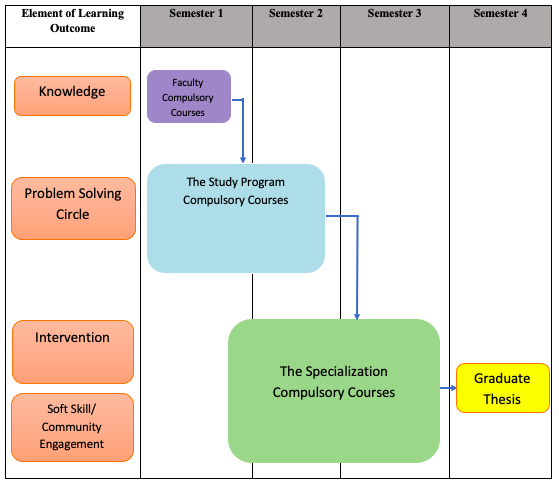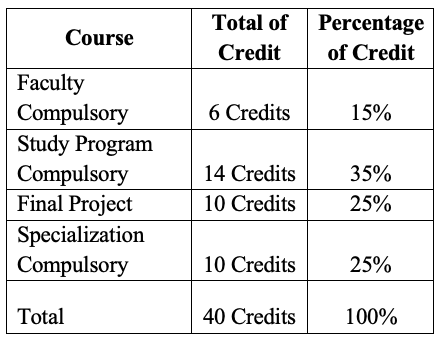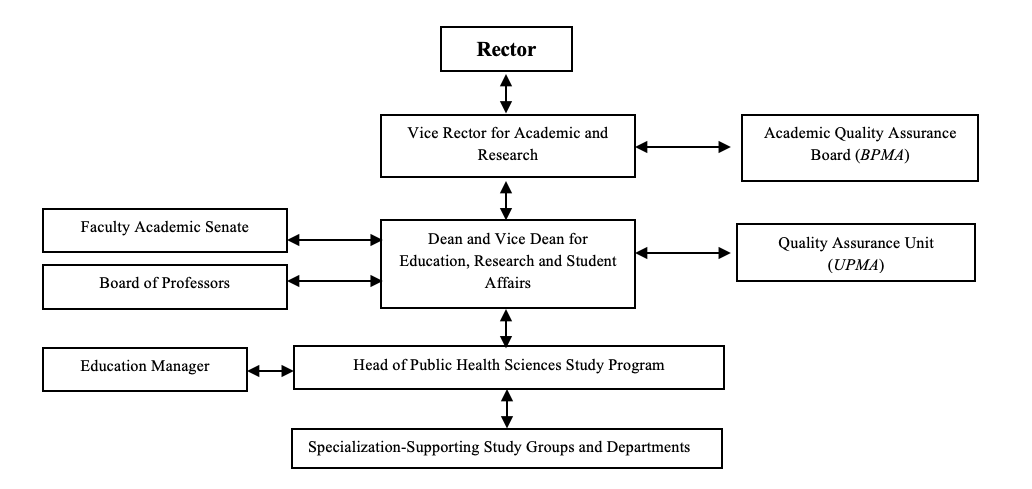History
The Universitas Indonesia (UI) Graduate Program in Public Health Sciences was established on July 1, 1965. The general objective of the Program is to generate masters with knowledge and skills in five public health majors (biostatistics, epidemiology, health policy and management, education and behavioral sciences, and environmental health).
Vision, Mission, and Objectives of the Study Program
Vision :
To be a center for the development of public health sciences that can contribute to health development in Indonesia and Southeast Asia.
Mission :
- Generating graduates with high integrity, intellectuality and professionalism in their field
- Organizing quality education and teaching programs
- Improving the quantity and quality of public health education through collaborations and partnerships with stakeholders
- Increasing the role of public health education providers through collaborations with professional institutions and associations
Objective of the Study Program
The objective of the Graduate Program in Public Health Sciences is to generate masters with quality that the nation can be proud of and a great contribution to the development of public health in Indonesia, upholding Indonesian culture, unity and integrity regardless of ethnicity and religion. The Study Program is expected to create leaders who are able to provide some recommendations in the form of evidence-based interventions for health problems, respect the local culture and are open to diverse thoughts.
Profile of Graduate
Profile of Graduates is prepared by paying attention to the needs of stakeholders and referring to some domestic and foreign references, such as:
- Public Health Education Academic Paper prepared by the Association of Indonesian Public Health Higher Education Institutions (AIPTKMI) and the Association of Indonesian Public Health Experts (IAKMI)
- Core Competencies for Public Health Professionals (Revised and Adopted by the Council on Linkages Between Academia and Public Health Practice: June 26, 2014, Available from: phf.org/corecompetencies)
- Foundation Competencies for Master of Public Health Graduates in Australia (Australian Network of Academic Public Health Institutions (ANAPHI) 15 September 2009)
Description of Profile of Graduates

Learning Outcomes
Based on analyses of the needs, policies, benchmarks with public health academic papers at UI and well-known universities abroad, as well as the formulation of learning outcomes with the professional organization of Indonesian Public Health Experts (IAKMI), the formulation of learning outcomes for Graduate Program in Public Health Sciences is as follows:
The Specialization Learning Outcomes in the Faculty of Public Health Universitas Indonesia (FKMUI) Graduate Program in Public Health Sciences
The table below shows the Learning Outcomes of each specialization under the Study Program
| General Learning Outcomes of the Graduate Program in Public Health Sciences | |
| 1. Able to develop second-level public healthcare by conducting: monitoring of health status, diagnosis, investigation and research on public health problems and disorders in their working area
2. Able to evaluate the implementation of second-level public health service policies 3. Able to develop managerial policies and program planning to support second-level public healthcare 4. Able to develop community empowerment methods to address public health issues at the second level 5. Able to assess the effectiveness, accessibility, and quality of second-level public healthcare 6. Able to communicate the results of their work to the community and second-level public health service stakeholders 7. Able to apply public health sciences including epidemiology, biostatistics, environmental health, social sciences, health behavior, occupational health and safety, health administration and policy, to be able to play a role as a researcher, academic, and second-level public health service manager 8. Able to lead the activities of planning, organizing, implementing, monitoring, controlling and evaluating programs 9. Able to manage applicative and evaluative research activities for the first- and second-level public healthcare 10. Able to provide some alternative health interventions by respecting the local culture, being communicative, participatory and open to diverse thoughts in leading the working group |
|
| Special Learning Outcomes of the Graduate Program in Public Health Sciences | |
| 1. | Health Economics Specialization |
| Able to analyze the efficiency of healthcare and programs | |
| 2 | Health Insurance Specialization |
| Able to analyze management and policy issues in commercial and social health insurance | |
| 3 | International Public Health Specialization |
| Able to recommend efforts to solve health problems using a global perspective | |
| 4 | Specialization in Health Service Management |
| Able to recommend managerial problem solving, plan, implement, and evaluate public health programs at the regional and national levels | |
| 5 | Health Policy and Law Specialization |
| 1. Able to analyze health policy and law to solve problems according to the context and dynamics of public health developments
2. Able to identify public health problems at the regional and national levels |
|
| 6 | Biostatistics Specialization |
| 1. Able to properly apply appropriate statistical methods in health research
2. Able to use appropriate statistical application software to process and analyze various data 3. Able to properly design appropriate research to solve public health problems 4. Able to apply methods of evaluating research results through critical review and identification of discrepancies and recommendations from a health study |
|
| 7 | Health Informatics Specialization |
| 1. Able to assess the concept of evidence-based information (evidence-based)
2. Able to formulate health indicators at the Central, Provincial and District/City levels 3. Able to analyze data into information 4. Able to assess the management of Health Information System (HIS), 5. Able to develop HIS to support public health management performance 6. Able to assess the latest information and communication technology (ICT) 7. Able to apply ICT software (spatial data management and analysis application) as a decision-supporting system |
|
| 8 | Nutrition Specialization |
| 1. Able to evaluate nutrition policy
2. Able to develop nutrition intervention programs in the community by considering local socio-cultural aspects 3. Able to develop research on public health nutrition |
|
| 9 | Environmental Health Specialization |
| 1. Able to develop a sustainable and competitive business in the field of environmental health
2. Able to apply eco-friendly concepts that have been developed using a scientific approach in their scientific discipline in a professional manner. 3. Able to develop applied technology in the field of environmental health 4. Able to analyze sustainable and competitive environmental health business problems 5. Able to develop new concepts of scientific approach in environmental health discipline 6. Able to analyze changes in the external environment that affect the quality of environmental health 7. Able to formulate information in the form of technology development models in carrying out integrated and responsible environmental health efforts |
|
| 10 | Environmental Health Epidemiology Specialization |
| 1. Able to interpret knowledge in the field of environmental health
2. Able to solve environmental health problems based on research using scientific method and reasoning approaches 3. Able to manage research that is useful for the development of environmental health efforts in Indonesia |
|
| 11 | Health Promotion Specialization |
| 1. Able to evaluate various health promotion strategies by considering socio-cultural aspects
2. Able to analyze public health problems and conduct health promotion interventions 3. Able to do community empowerment in the health sector by referring to the local culture and analyzing the results 4. Able to implement concepts and dynamics of human relations in establishing networks and collaborations with partners in health promotion |
|
| 12 | Healthcare Quality Specialization |
| Able to master the basic concepts and development of healthcare quality, standardization, human resources for quality, risk management and assessment, organizational development and behavior, total quality management (TQM), cultural transformation for quality improvement, various ways to measure any quality dimension, effective organization, managerial accomplishment in TQM, quantitative aspect of quality and quality improvement project | |
| 13 | Reproductive Health Specialization |
| 1. Able to develop community outreach methods to in terms of Maternal Healthcare, Child Health and Survival, Adolescent Health, Family Planning and Sexually-Transmitted Diseases
2. Able to develop reproductive health counseling methods to the community 3. Able to develop programs based on the latest reproductive health issues 4. Able to analyze any Strategic Indicator in Reproductive Health and make the program planning |
|
| 14 | Specialization in Community Mental Health and Disability |
| 1. Able to design appropriate and valid research to address community mental health and disability issues.
2. Able to apply appropriate and valid statistical methods and application software in public health research related to mental health and disability. 3. Able to assess the concept of evidence-based information. 4. Able to analyze data into information 5. Able to interpret knowledge in the field of community mental health and disability 6. Able to interpret knowledge and understand disability issues related to physical limits, intellectual, illness and mental disorders. |
|
| 15 | Specialization in Institution-Based Local Health Management |
| 1. Able to improve the quality of public healthcare management efforts which include promotive, preventive, rehabilitative and curative aspects.
2. Able to develop capabilities of advocacy and quality improvement, as well as public health risk management in an institution in a region. |
|
| 16 | Specialization in Region-Based Local Health Management |
| Able to manage public health from promotive, preventive and rehabilitative aspects and develop a qualified region-specific health system, so as to make it fast, precise, organized and sustainable in developing a public health effort in an area. | |
| 17 | Elderly Health Specialization |
| Able to develop public health programs/interventions with an elderly perspective, analyze health policies related to the elderly and conduct a comprehensive advocacy and evaluation of elderly programs |
Flowchart of Courses and Learning Outcomes

Structure of Graduate Program in Public Health Sciences Courses
The following table below shows the structure of courses in composition of the Faculty Compulsory, Study Program Compulsory, Final Project and the Specialization Compulsory Courses:

List of the Specialization Compulsory Courses
| a. Health Economics Specialization |
| COURSE NAME |
| Welfare Economy |
| Financial Management |
| Health Economics |
| Healthcare Econometrics |
| Economic Evaluation in Health Programs |
| Health Financing |
| b. Health Insurance Specialization |
| COURSE NAME |
| Insurance and Risk |
| Health Facility Payment/Provider Payment |
| Health Economics |
| Healthcare Econometrics |
| Commercial Health Insurance and Managed Care |
| Social Security in Different Countries |
| c. Specialization in Health Service Management |
| COURSE NAME |
| Health System |
| Financial management |
| Health Economics |
| Current Issues in Health Management and Policy |
| HR Management |
| Evidence-Based Health Development |
| d. Health Policy and Law Specialization |
| COURSE NAME |
| Introduction to Legal Studies (Philosophy, Theory, Sociology of Law, Law in Indonesia) |
| Health Economics |
| Health Policy Making |
| Health Law |
| Evidence-Based Health Development |
| Electives |
| e. Biostatistics Specialization |
| COURSE NAME |
| Health Demographics |
| Sample Design and Development of Health Research Measurements |
| Modern Data Analysis in Health |
| Spatial Statistics |
| Advanced Biostatistics Seminar |
| Electives |
| f. Health Informatics Specialization |
| COURSE NAME |
| Computer Network Programming and Development in the Health Sector |
| Health Indicator Development and Data Collection |
| Geographic Information System |
| Intermediate Health Information System Analysis and Design |
| Electives |
| g. Public Health Nutrition Specialization |
| COURSE NAME |
| Energy and Macro Nutrients |
| Micro Nutrients |
| Nutrition Promotion |
| Nutrition and Disease |
| Application of the Positive Deviance Approach in the Field of Nutrition |
| Emergency Nutrition |
| Public Health Nutrition Policy and Program Analysis |
| h. Environmental Health Specialization |
| COURSE NAME |
| Region-Based Disease Management |
| Environmental Health Disaster and Emergency Response |
| Management of Water Resources, Industrial Liquid Waste & B3 (Hazardous and Toxic Waste) |
| Food Safety and Prevention of Food Poisoning and Vector |
| Toxicology, Risk Analysis and Public Health Audit |
| Electives |
| i. Environmental Health Epidemiology Specialization |
| COURSE NAME |
| Region-Based Disease Management |
| Region-Based Surveillance |
| Epidemiology of Diseases Related to Environmental Pollution |
| Critical Review of Environmental Health Epidemiology |
| Toxicology, Risk Analysis and Public Health Audit |
| Electives |
| j. Health Promotion Specialization |
| COURSE NAME |
| Intermediate Health Behavior |
| Intermediate Community Organization and Development |
| Health Promotion Planning and Evaluation |
| Health Promotion Advocacy |
| Socio-Cultural Aspects of Health |
| Intermediate Health Communications |
| Electives |
| k. Community Mental Health and Disability Specialization |
| COURSE NAME |
| Introduction to Community Mental Health and Disability |
| Intermediate Community Organization and Development |
| Stigma and Discrimination of Chronic Disease |
| Social Protection and Healthcare |
| Health Promotion Advocacy |
| Community-Based Rehabilitation and Inclusive Development |
| l. Healthcare Quality Specialization |
| COURSE NAME |
| Healthcare Quality Strategy and Management |
| Standardization and Accreditation of Healthcare |
| Quality and Health Risk Monitoring & Assessment |
| Quantitative Aspects of Healthcare Quality |
| Organizational Development and Behavior |
| Healthcare Quality Improvement Project |
| Electives |
| m. Reproductive Health Specialization |
| COURSE NAME |
| Maternal Safety, Child Survival and Epidemiological Aspects |
| Women’s Health and Reproductive Nutrition |
| Quality Management of Reproductive Healthcare |
| Psychosocial Aspects of Reproductive Health |
| Elderly Reproductive Health |
| Adolescent Reproductive Health 2 |
| Sexually-Transmitted Diseases and HIV/AIDS |
| n. International Public Health Specialization (UI – Curtin University Joint Degree) |
| COURSE NAME |
| Health Policy and Analysis (Health Policy) |
| Nutrition and Disease (Public Health Nutrition Principles) |
| Environmental Health (Environmental Health Management) |
| Health System (Organization of Health Care System) |
| Application of the Positive Deviance Approach in Nutrition (Public Health Nutrition Practice) |
| Public Health Response to Climate Change (Public Health Response to Climate Change) |
| Epidemiology of Infectious Diseases (Epidemiology of Infectious Diseases) |
| o. Region-Based Local Health Management |
| COURSE NAME |
| Health System |
| Current Issues in Health Management and Policy |
| Region-Based Disease Management |
| Evidence-Based Health Development |
| Intermediate Community Organization and Development |
| p. Specialization in Institution-Based Local Health Management |
| COURSE NAME |
| Healthcare Quality Management and Strategy |
| Quality and Health Risk Monitoring & Assessment |
| Health Promotion Advocacy |
| HR Management |
| Organizational Development and Behavior |
| Intermediate Health Communications |
| q. Elderly Health Specialization |
| COURSE NAME |
| Hormonal & Physiological Changes in the Elderly |
| Non-Infectious Diseases in the Elderly |
| Infectious Diseases and Immunity in the Elderly |
| Life Quality in the Elderly |
| Successful and Independent Elderly |
| Population Dynamics & Elderly Healthcare |
| Field Study |
Organizational Structure




